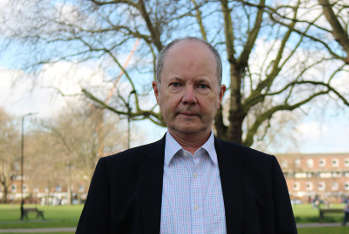The campaign group that has repeatedly defeated the Government in court over the adequacy of its plans to tackle air pollution has accused ministers of producing a ‘shabby rewrite’ of earlier plans.
The Government’s latest national air quality plan to tackle toxic Nitrogen Dioxide emissions, mainly from road transport, again puts the onus on local authorities to produce their own plans, albeit with a new £255m funding package.

ClientEarth CEO James Thornton
James Thornton, CEO of environmental lawyers ClientEarth, said: ‘On our initial examination, this is little more than a shabby rewrite of the previous draft plans and is underwhelming and lacking in urgency. Having promised to make air quality a top priority, [environment secretary] Michael Gove appears to have fallen at the first hurdle.
‘This plan is, yet again, a plan for more plans. The Government is passing the buck to local authorities to come up with their own schemes as an alternative to clean air zones which charge the most polluting vehicles to enter our towns and cities. Yet [environment department] Defra’s own evidence shows that charging clean air zones would be the swiftest way to tackle illegal levels of pollution.
‘We are still looking at December 2018 before local authorities need to come up with their proposals but we have no idea when those plans would then be put in place or whether they’d be effective. This plan kicks the can down the road yet again.’
Friends of the Earth described the announcement as a ‘cynical, headline-grabbing move which passes the buck of saving lives to local authorities’ by failing to mandate the introduction of Clean Air Zones.
The Government also pledged to establish a Clean Air Fund, which will allow local authorities to bid for additional money to support the implementation of measures to improve air quality.
'This could include interventions such as improvements to local bus fleets, support for concessionary travel and more sustainable modes of transport such as cycling, or infrastructure changes.'
Simon Neilson, president of council directors' body ADEPT, pointed out that a lot of the £3bn funding included in the plan has been announced before.
He said: 'We agree that local authorities are often best placed to take local action, as they know their areas, but it would be more helpful to have a set of nationally agreed options to support councils with technical expertise, time and resource. The Clean Air Fund will be a competitive process, pitching councils against each other while again spending more time and scarce resource preparing uncertain bids.

ADEPT president Simon Neilson
‘Charging is one of the most effective and speediest measure open to local authorities but we think the Government should have shown strong, national commitment to implementation, rather than leaving it to local authorities to introduce such politically unpalatable measures.’
Local Government Association environment spokesman Cllr Martin Tett offered broad support to ministers. He said: 'It is important that councils (will) have the flexibility to deliver their own plans to improve air quality in their areas, particularly with regard to clean air zones as well as expanded road and traffic measures.’
However, Cllr Jack Scott, Sheffield Council’s cabinet member for transport and sustainability, accused the Government of failing in its duty to protect its citizens from harm and ‘unfairly passing the buck on to local councils'.
He said: ‘I’m highly sceptical that the Government’s announcement today even meets their legal duties on air quality, and their response has been woefully inadequate.'
Dr Adrian Philips, director of public health at Birmingham City Council, one of five cities that will be required to bring in a charging Clean Air Zone, said: 'We are clear that any measures implemented in Birmingham, including a Clean Air Zone, must be based on robust evidence, which we are currently gathering in order to develop our proposals ahead of a full public consultation. This is in addition to the work we are already doing to improve air quality across the city.
'The challenge is enormous and our greatest concern is that the time for councils to take real action is fast running out, yet they bear the brunt of the health and economic problems. Responsibility should not rest solely with local authorities.'
The Parliamentary Advisory Council for Transport Safety (PACTS) called on the Government not to overlook safety needs and urged councils to think very carefully before removing speed humps in the name of public health - a measure mooted in the air quality plan to prevent start/stop driving, which creates more emissions.
Executive director David Davies said: ‘PACTS strongly supports measures to improve air quality in our towns and cities. But the Government must not throw out the safety baby with the air quality bathwater. We need vehicles that are clean, driven at speeds that are safe.'
Register now for full access
Register just once to get unrestricted, real-time coverage of the issues and challenges facing UK transport and highways engineers.
Full website content includes the latest news, exclusive commentary from leading industry figures and detailed topical analysis of the highways, transportation, environment and place-shaping sectors.
Use the link below to register your details for full, free access.
Already a registered? Login